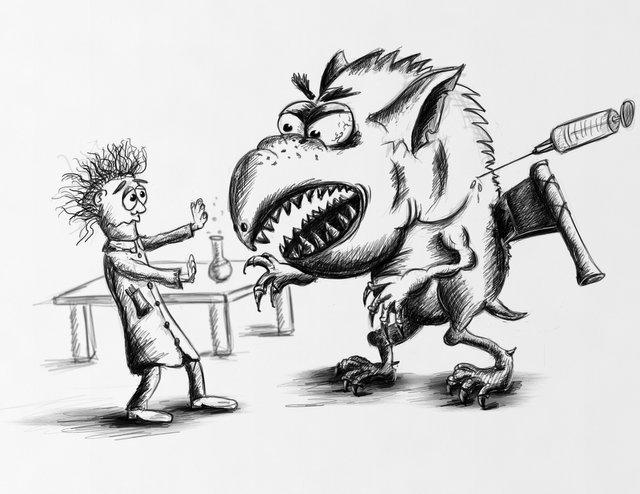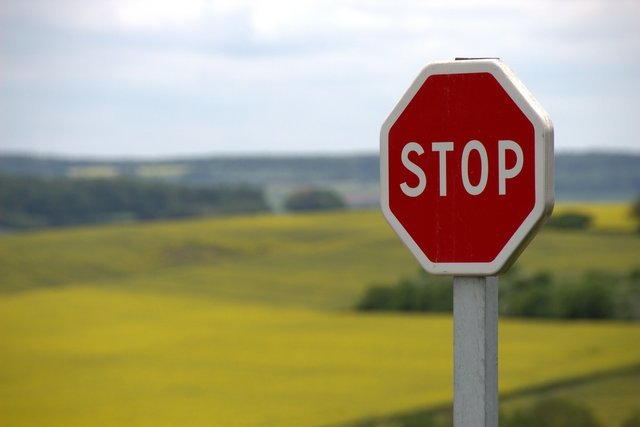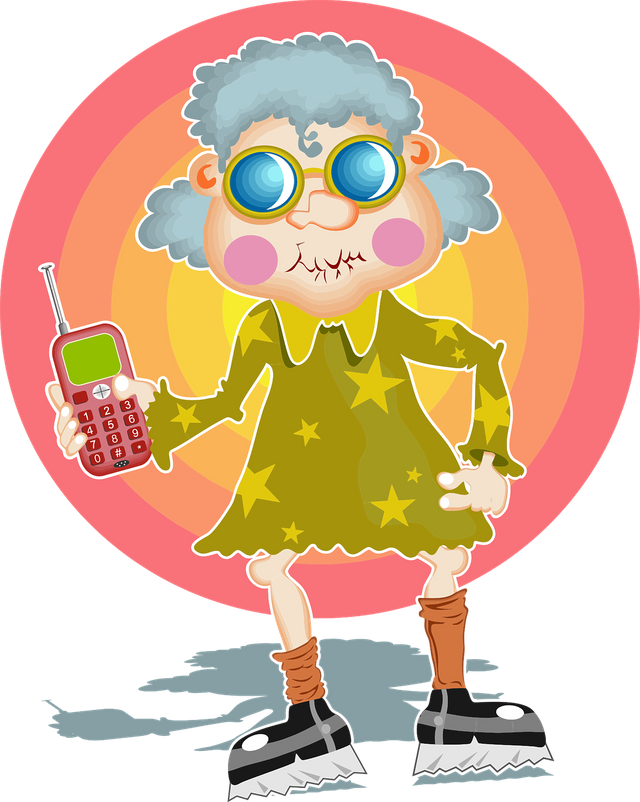Hello, everyone! I hope I find you in good health and with lower stress levels. Last time I wrote about the stress-monster and how it could affect your well-being and physical health. As most of you pointed out in the comment section, we are all quite aware that it is a part of our lives. Furthermore, it would be rather naive to expect zero stress levels.
However, living with monsters is not a good way of living. It is much better if one tries to tame them and turn them into something more predictable and controllable. Otherwise, as the endocrinologist Hans Selye warned, its roaring and scratching will exhaust your body and mind. Yeah, I know, Salye didn't mention any monsters. He was a well-established (and serious) scientist who discovered that when being under stress living creatures tend to respond in a similar way. First, they experience an activation of the hypothalamic-pituitary-adrenal system as the body is prepared for energy expenditure (fight or flight). Then, they try to resist the activation and calm down. This is the so-called resistance phase. If the stress endures for too long, they go into an exhaustion phase. This is the phase in which the body becomes prone to different deseases. (1)

Some of you shared their great strategies for dealing with stress. Thank you for putting this effort! In summary, all of you shared your conscious techniques to cope with stress. I use the word conscious here to state that you were fully aware of what you were doing in order to deal with the stress.
Furthermore, all of you listed a set of things you do to relieve your stress levels. It looks like each of us is armed with a collection of coping strategies in order to cope with everyday stress.
We differ in many ways as far as our personality is concerned. Everyone has their own unique set of personality traits.
However, not only we vary in our personality traits but each of us uses a different set of tools to deal with stress. In other words, everyone has their unique set of coping strategies.
Coping strategies are defined as conscious and voluntary efforts to regulate emotions, behaviors, cognitions, and psychophysiology and environment variables in response to the stress of everyday
events (2)
Let’s put this straight in case it sounds too complicated:
Coping refers to the thoughts and actions we use to deal with a threatening situation. (7)
However, not all coping strategies lead to a positive result. One may engage in ineffective coping behavior like using drugs or being aggressive. There are many coping strategies that may look like a quick and easy way to reduce stress, but in the long term, they make things even worse. Another example of the unproductive (or maladaptive) coping strategies is alcohol abuse.

Generally speaking, coping strategies are divided into two main groups – adaptive vs maladaptive coping strategies (8). As you have probably already guessed, adaptive strategies are the “good guys”. They help youadapt to the new circumstances and get back to normality.
On the other hand, maladaptive coping strategies do exactly the opposite. At first, they seem like they relieve your stress levels, though they actually prolong the time you are under stress and lead to the phase of exhaustion (1). You may instantly feel better when you drink a bottle of liqueer every night. Does it help you feel less lonely? I doubt it. In the long term, you would continue to feel lonely and the chances of meeting someone would lower. Nobody likes dating drunks after all.
Coping strategies are extremely important when it comes to mental health and subjective well-being. Using adaptive coping style may lower the probability of a disease occurrence and may increase the likelihood of achieving and maintaining excellent levels of health and quality of life (3). Nevertheless, maladaptive strategies usually correlate with emotional distress, including symptoms of depression and anxiety, as well as socio-emotional maladjustment (4, 5).
If you start Cognitive-Behaviour therapy (CBT in short), your coping strategies will be one of the first things your therapist will assess. That is how important they are! In case your therapist concludes that you use maladaptive coping strategies, your therapeutic work will be focused on adopting more productive coping mechanisms.
Your coping strategy is your way out of your problem.
Do you remember the fairy-tale of Henzel and Gretel? Your coping strategy is like the stones and the crumbs Henzel left on the path. The stones are solid and endurable. They will show you the right way. The stones are like adaptive coping strategies. The crumbs, on the other hand, are not reliable. They seem like they will do the work, but in the end they will simply leave you lost deep in the woods. The crumbs are like maladaptive coping strategies.

Nope! There are no perfect people (as we all know). There is no human being on Earth who uses only adaptive coping strategies. We all engage in various behaviors. Some of them are adaptive, others are not.
I remember how fascinated I was when I discovered the world of the coping styles during the first years in the university and my CBT training. Then the inevitable thing happened. I started to discover the unproductive behaviors I used in some stressful situations. So, I started beating myself up about it. Don’t worry! This is something that psychology students often do. However, it is another maladaptive coping mechanism. It was a long way until I got to the point in which I stopped to engage in self-blaming, but in rather more effective behavior like self-reflection and re-evaluation. The latter is much more likely to bring you a positive affect at the end of the day (6).
Gradually, I started to reevaluate my reactions in certain stressful situations and consciously apply more adaptive coping strategies. For example, when being stressed and angry I used to socially withdraw and shut myself off. It was quite unproductive because it didn’t lead to any change. Furthermore, not dealing with the situation made me even angrier and more stressed. Realizing that, I started putting effort to speak my mind out loud and be more active in dealing with the distressful situations.
Learning new behavior models, reflecting and reevaluating is a never-ending process, though. I keep doing all of these on a daily basis. And I am getting better and better in my new behavior models. Imagine what a super-woman I could be after 70 years of reevaluating and self-reflecting. Yep! A 90-year-old super-granny: D

Jokes aside. I strongly believe that the coping strategies we use are a key to happy and fulfilling lives. That is why I decided to bring this issue up. Next time we will examine different examples of adaptive and maladaptive coping strategies. I am sorry, but I simply couldn’t put it all into a single article.
In the end, I have a little task for you. It is a small case based on two real stories (all the names and the irrelevant information have been replaced). If you find it fun to make assumptions, please leave me a comment with your hypothesis. I would enjoy discussing it.
Here is the case:
Lessley and Michael were both in their late 50’s. Both of them were well established in their professions. Lessley was a newspaper journalist and Michael was an engineer.
Unfortunately, both Lessley and Michael faced something unexpected. Their wives asked for a divorce.
Lessley and Michael went into a deep crisis. Both of them felt like everything they had built for the past 30 years, was just slipping between their fingers. Or at least they thought so.
Now Lessley and Michael are in their mid 60’s.
Lessley is doing rather well. He is working as a freelance journalist for some online magazines. He has left his home country and moved to Italy. He has an Italian girlfriend (Adriana) who owns a small shop in a relatively small village. They met online after Lessley’s daughter sighed him up on an online dating site.
Michael, on the other hand, is not coping that well. He was fired from his work as a constructor. He is not looking for a new job. He complains of poor health. He doesn’t shower and forgets to eat. He spends most of his time inside his apartment, drinking all day and watching TV. He doesn’t see his friends anymore and rarely calls his family. He doesn’t answer his phone either.
So, what do you think happened in between? Why these people ended up in such a different way when a similar event happened to both of them? What are your assumptions about the effective and ineffective behaviors they used?
Thanks for spending your precious time reading this article. I hope I see you around.
References:
(1) Selye, H. (1950). Stress and the General Adaptation Syndrome. British Medical Journal, June 17, 1383-1392
(2) F Rodríguez, F., Torres, M., Páez, J., Inglés, C. (2016) Prevalence of strategies for coping with daily stress in children. Psychotema, 2016, Vol. 28, No4, p. 370-376
(3) Folkman, S., & Moskowitz, J. T. (2004). Coping: Pitfalls and Promise. Annual Review of Psychology, 55, 745-774.
(4) Lapointe, V., & Marcotte, D. (2000). Gender-typed characteristics and coping strategies of depressed adolescents. European Review of Applied Psychology, 50, 451-460.
(5) Seiffge-Krenke, I. (2000). Causal links between stressful events, coping style, and adolescent symptomatology. Journal of Adolescence, 23, 675-691.
(6) Dunkley, D. (2016). Perfectionism and daily stress, coping, and affect: Advancing multilevel explanatory conceptualizations. In the book “The psychology of perfectionism: Theory, research, applications”, Publisher: London: Routledge, Editors: J. Stoeber, pp.33
(7) https://humanstress.ca/stress/trick-your-stress/steps-to-instant-stress-management/
(8) https://en.wikipedia.org/wiki/Coping_psychology
Images (under CC0 Creative Commons):
https://pixabay.com/en/monster-laboratory-scientist-3080733/
https://pixabay.com/en/stop-shield-traffic-sign-road-sign-634941/
https://pixabay.com/en/superman-superhero-cape-sky-1016322/
https://pixabay.com/en/cell-phone-comic-characters-1298944/
Thanks for using eSteem!
Your post has been voted as a part of eSteem encouragement program. Keep up the good work! Install Android, iOS Mobile app or Windows, Mac, Linux Surfer app, if you haven't already!
Learn more: https://esteem.app
Join our discord: https://discord.gg/8eHupPq
Thank you so much for sharing this amazing post with us!
Have you heard about Partiko? It’s a really convenient mobile app for Steem! With Partiko, you can easily see what’s going on in the Steem community, make posts and comments (no beneficiary cut forever!), and always stayed connected with your followers via push notification!
Partiko also rewards you with Partiko Points (3000 Partiko Point bonus when you first use it!), and Partiko Points can be converted into Steem tokens. You can earn Partiko Points easily by making posts and comments using Partiko.
We also noticed that your Steem Power is low. We will be very happy to delegate 15 Steem Power to you once you have made a post using Partiko! With more Steem Power, you can make more posts and comments, and earn more rewards!
If that all sounds interesting, you can:
Thank you so much for reading this message!
Congratulations @zulfikaraw! You received a personal award!
Happy Birthday! - You are on the Steem blockchain for 1 year!
Click here to view your Board
Congratulations @zulfikaraw! You received a personal award!
You can view your badges on your Steem Board and compare to others on the Steem Ranking
Vote for @Steemitboard as a witness to get one more award and increased upvotes!